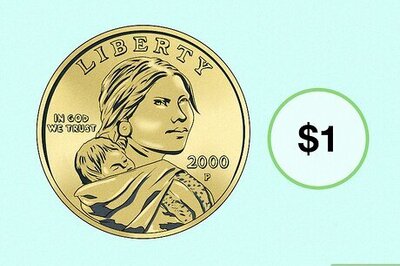
views
New York: Oil smashed through record highs Friday, cruising past $75 a barrel on continued fears of a supply disruptions in Iran and Nigeria and reports of spot gas shortages on the US East Coast.
US oil for June delivery set a new trading high of $75.35 before easing to settle up $1.48 at 75.17 a barrel on the New York Mercantile Exchange, also a new closing record. The May contract expired Thursday at $71.95.
One trader said the tense international situation left many investors reluctant to bet prices were going to come down before they left for the weekend.
"Over the weekend traders aren't able to respond to any political news," said Brian Hicks, co-manager of the Global Resources Fund at US Global Investors. "It's safer to be long than short."
Hicks said the soaring prices could start eating into demand and that certain predictions - like one he said he heard by Venezuela's President Hugo Chavez that oil could spike to $100 a barrel if the US attacks Iran - aren't helping.
"It's that kind of news flow that seems to be driving the oil traders," he said. "It's somewhat concerning."
Oil has been hitting record highs in recent sessions, unadjusted for inflation, on supply worries fed by fears of a confrontation with Iran, the world's fourth-biggest producer.
But it's also within sight of inflation-adjusted highs of around $80 a barrel set in the late 1970s and early 1980s following the gas crisis and the Iranian revolution.
US average gas prices moved closer to the $3 a gallon mark Friday as spot shortages were reported along the East Coast.
Gasoline averaged $2.855 for a gallon of regular Friday, up 35 cents, or about 14 percent, in the last month, according to AAA, the consumer group formerly known as the American Automobile Association.
The shortages were not expected to be serious however and were blamed on seasonal changes in gasoline formulas.
Gas prices closely follow crude prices, which have jumped about 19 percent this year, mainly on political uncertainty or violence in Iran, Nigeria, Venezuela and Russia - all major producers. Oil prices soared 45 per cent in 2005.
Iran has been at the forefront in recent weeks as it tangles with the West over its nuclear program.
Friday passed with no easing of the tensions in sight.
Iran's president said the country would rely on domestically produced gasoline starting this fall, a move that was seen as an attempt to insulate the country against sanctions, which the US has been pushing for, Reuters reported.
The US said Friday that Russia must halt a planned sale of surface-to-air missiles to Iran. An American official said the Islamic state had "both feet on the accelerator" with its nuclear program, according to Reuters.
Iran says its nuclear program is intended for civilian purposes, while many western countries say its intended to build a bomb and President Bush has refused to rule out a preemptive nuclear strike on the country.
The situation in Nigeria is also pushing up prices, as nearly one quarter of the country's high-quality crude is shut in due to tensions with militants, who want more control over how the country's oil wealth is dispensed.
The militants, who operate in an oil rich but impoverished area of the country, have reportedly set a deadline of April 25 before they renew attacks on government and oil facilities in the country.
But politics is only part of the story with crude prices. Oil has been on a charge for the last few years, more than tripling in price since the start of 2002.
Big fund money, faced with low global interest rates and a lackluster US stock market, have helped fuel the rise as they chase returns in all types of commodities, including oil.
And fundamental supply and demand has also played a big part as discoveries of new, easily recoverable supplies have failed to keep pace with ever rising demand from the US and developing countries like China and India.



















Comments
0 comment